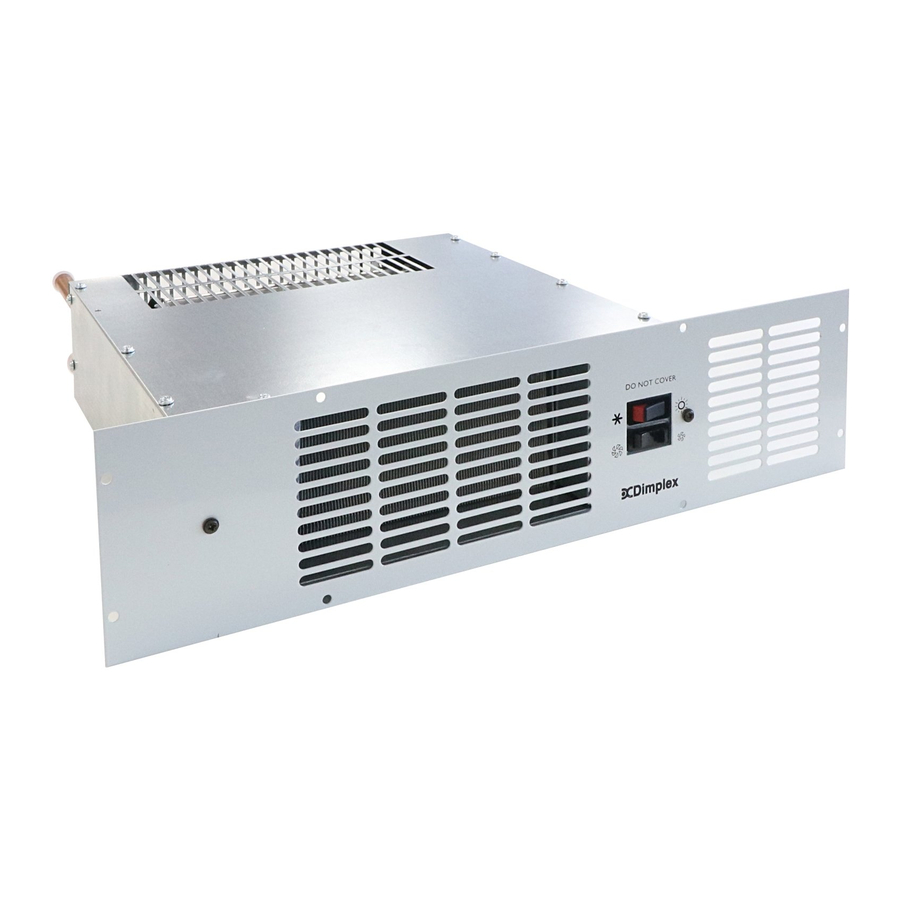Dimplex BUH19BWS Instrukcja instalacji i obsługi - Strona 2
Przeglądaj online lub pobierz pdf Instrukcja instalacji i obsługi dla Grzałka elektryczna Dimplex BUH19BWS. Dimplex BUH19BWS 4 stron. Hydronic base unit heater
Również dla Dimplex BUH19BWS: Instrukcja obsługi (4 strony)

WARNING - disconnect the heater from the
electricity supply before undertaking service,
repair or cleaning.
The supply circuit to the heater must incorporate
a double pole isolating switch having a contact
separation of at least 3mm.
General
This heater has been designed for fitting in the space behind
the plinth of floor standing kitchen units or other fitted furniture
units. It is recommended that the heater is not installed under
cupboards used for storing perishable goods.
This heater may be fitted in place of or in addition to existing
radiators. Using the hot water from the central heating system
and a powerful electric faint will produce an average 2.0kW
of heat into the room.
Installation
The heater is more easily fitted during the installation of
new furniture units, or in existing furniture units if they can
be temporarily moved from their position against the wall. If
an existing furniture unit cannot be moved, then it may be
necessary to remove the back of the unit in order to gain
access to carry out the wiring installation.
Before installing the unit consider the location with respect
to the following:
•
The product has a depth of 395mm, the length of the
valves and flexible cable should also be taken in to
consideration.
•
The electrical supply and cable length.
•
Position of system pipework and flexible hose length.
•
Position the heater to deliver heat effectively without
causing personal discomfort from overheating while
standing at work surfaces etc.
•
If the overhang above the heater is greater than 75mm,
then a distance of at least 100mm must be maintained
between the overhang and the uppermost part of the
heater (see Fig. 1 below).
Central heating design system
1. When fitting the appliance onto a central heating system
check that the boiler is capable of delivering extra heat
into the appliance by resizing the system. The appliance
will add an average of 2kW (6,830 Btu/Hr) onto the boiler
sizing.
2. Due to the low water content of the heat exchanger in
the appliance compared to a panel radiator system,
an adequate flow of water should be maintained to
compensate for rapid cooling of the water as it passes
through the exchanger i.e. maximum efficiency is gained
if the appliance is placed as near to the boiler as possible
to give the maximum pressure head across the appliance.
Installation procedure
Ensure that all packing items are removed (read any warning
labels carefully). Retain all packing for possible use, in the
event of moving or returning the heater to your supplier.
Cutting the aperture in the plinth
Cut aperture in furniture unit plinth to dimensions shown. This
must be positioned so that the minimum distance from the
bottom of the aperture to the top surface of any floor covering
is not less than 12mm and not more than 25mm (see Fig. 2).
If an overhang above the heater is greater than 75mm, then
a distance of at least 100mm must be maintained between
the overhang and the uppermost part of the heater.
Water Connections
WARNING: Do NOT connect electricity supply when making
water connections.
Connect the flexible pipes to the system flow and return pipes.
The appliance terminates in 15mm pipe tails (top pipe flow
– bottom pipe return). Connect the valve ends of the flexible
pipe to the rear of the appliance. (Note: The direction of flow
arrows on the valves are not significant in this application.)
(see Fig. 3).
Fill and vent the system and bleed the air out of the heat
exchanger using the bleed screw provided (located at the
top of the flow pipe).(see Fig. 4).
Fig. 1
Close the vent and check the appliance for water leaks. If any
water escapes from the bleed screw ensure ensure it does not
fall onto any electrical wiring or connections. After bleeding
the appliance ensure that electrical controls are completely
dry before connecting to the power supply.
Fig. 2
Fig. 3
Fig. 4
